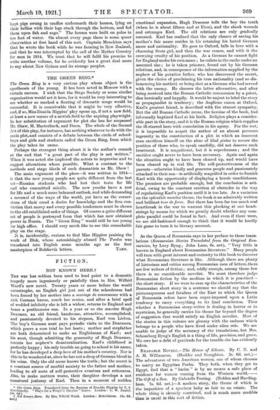FICTION.
NOT KNOWN HERE.t
THE war has seldom been used to lend point to a domestic tragedy more ingeniously or painfully than in Mrs. Wilfrid Ward's new novel. Twenty years or more before the world catastrophe, an English girl just out of the schoolroom had been forced by her mother into a mariage de convenance with a rich German baron, much her senior, and after a brief spell of wedded infelicity she is left a widow, returns to England and bears a posthumous son. In a year or so she marries Hugh Dearmer, an old friend, handsome, attractive, accomplished, and passionately devoted to his stepson, Karl von Lieben. The boy's German aunt pays periodic visits to the Dearmers, which prove a sore trial to her hosts ; mother and stepfather are both determined to make an Englishman of Karl ; and his aunt, though admitting the generosity of Hugh Dearmer, resents her nephew's denaturalization. Karl's childhood is perfectly happy ; his only trouble on going to school is his name, for he has developed a deep love of his mother's country. Nor is this to be wondered at, since he has not a drop of German blood in his veins. Only the old nurse knows the truth ; but the secret is a constant source of morbid anxiety to the father and mother, leading to all sorts of self-protective evasions and reticenees. Also, to make matters worse, their daughter develops a not unnatural jealousy of KarL Then in a moment of sudden • The Green Ring. Translated-from the Russian of Zinaida Hipplus by S. S. Xoteliansky. " Plays for a People'a Theatre " Series. London : C. W. Daniel. lie. ed.) t Not Known rim. By Mrs. Wilfrid Ward. London : lintchinson. Ids. 13d. net.]
emotional expansion, Hugh Dearmer tells the boy the truth (when he is about fifteen and at Eton), and the shock wounds and estranges ICarl. The old relations are only gradually
resumed. Karl has realized that the only chance of saving his mother's fair name resides in his retaining his hated German name and nationality. He goes to Oxford, falls in love with a charming Scots girl, and then the war comes, and with it the crowning cruelty of his position. As a German he cannot fight for England under his own name ; he enlists in the ranks under an assumed one ; he is taken prisoner, found out by his German relations, and, in consequence of the information supplied by the nephew of his putative father, who has discovered the secret, given the choice of proclaiming his true nationality (and so dis- honouring his mother) or being shot as a German who had served with the enemy. He chooses the latter alternative, and after being received into the Roman Catholic communion by a priest, dies heroically and happily. It would be unjust to label the story as propagandist in tendency ; the Anglican canon at Oxford, Karl's greatest friend, is described with the utmost sympathy. But the old Roman Catholic nurse, the heroine of the book, had informally baptized Karl at his birth. Religion plays a consider- able part in the story, and it is the Roman religion which supplies the ill-starred hero with consolation in his agony. For the rest, it is impossible to acquit the author of an almost perverse ingenuity in the construction of a plot in which an innocent man sacrifices himself on the altar of filial pietas to secure the position of those who, to speak candidly, did not deserve such treatment. It is magnificent, but it is superhuman ; and the sacrifice ought never to have been necessary. Again and again the situation ought to have been cleared up, and would have been cleared up in real life. The self-protectiveness of the parents—otherwise kindly and generous people and passionately attached to their son—is artificially magnified in order to furnish Karl with the opportunity of displaying a heroic unselfishness. The premises are probable enough, but the conclusion is arti- ficial, owing to the constant erection of obstacles in the way of regularizing Karl's position until it is too late. As a variation on the splendide mendax theme, the book is an admirably written and brilliant tour de force. But there has been far too much real heartbreak in the war to warrant this plucking at our heart- strings by means for which we greatly doubt whether any com- plete parallel could be found in fact. And even if there were, we are old-fashioned enough to think that it would be hardly fair game to turn it to literary account.


































 Previous page
Previous page